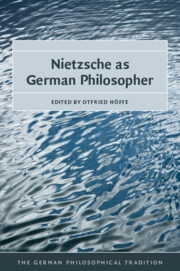Book contents
- Nietzsche as German Philosopher
- The German Philosophical Tradition
- Nietzsche as German Philosopher
- Copyright page
- Contents
- Contributors
- Source Acknowledgments
- Abbreviations
- Introduction
- I The Aesthetic Dimension
- II Philosophical Themes
- 5 Nietzsche’s Invention of the Pre-Socratics
- 6 Nietzsche’s Stance toward Ancient and Modern Enlightenment
- 7 “An Animal That May Make Promises” (GM II, 1–3)
- III Power and Truth
- IV Religion and Religiosity
- Bibliography
- Index
6 - Nietzsche’s Stance toward Ancient and Modern Enlightenment
from II - Philosophical Themes
Published online by Cambridge University Press: 18 February 2021
- Nietzsche as German Philosopher
- The German Philosophical Tradition
- Nietzsche as German Philosopher
- Copyright page
- Contents
- Contributors
- Source Acknowledgments
- Abbreviations
- Introduction
- I The Aesthetic Dimension
- II Philosophical Themes
- 5 Nietzsche’s Invention of the Pre-Socratics
- 6 Nietzsche’s Stance toward Ancient and Modern Enlightenment
- 7 “An Animal That May Make Promises” (GM II, 1–3)
- III Power and Truth
- IV Religion and Religiosity
- Bibliography
- Index
Summary
Nietzsche’s philosophy gained recognition as a mythology of the Counter-Enlightenment. From Ernst Bertram’s mythologization of Nietzsche’s life, via Thomas Mann’s Reflections of an Unpolitical Man, from the George Circle and the Conservative Revolution to the National Socialist Alfred Baeumler, Nietzsche’s philosophy was presented as antirationalistic and anti-Western. Baeumler concisely put it this way: Nietzsche fought “his entire life” “against two historical worlds,” “against the clerical-Romantic world and against the rational-Enlightenment one.”1 What was right for Nietzsche’s conservative and National Socialist students was only fitting for his opponents on the left and, as we know, Nietzsche is forced to appear in Georg Lukács’ Destruction of Reason as an irrationalist. He is made to stand as an intermediary between the irrationalism of Schelling’s philosophy and the catastrophe of reason called fascism.2
- Type
- Chapter
- Information
- Nietzsche as German Philosopher , pp. 112 - 138Publisher: Cambridge University PressPrint publication year: 2021

